Karuta
Karuta (かるた, from Portuguese carta) are Japanese playing cards. Playing cards were introduced to Japan by Portuguese traders during the mid-16th century. These early decks were used for trick-taking games. The earliest indigenous karuta was invented in the town of Miike in Chikugo Province at around the end of the 16th century. The Miike Karuta Memorial Hall located in Ōmuta, Fukuoka, is the only municipal museum in Japan dedicated specifically to the history of karuta.
Karuta packs are classified into two groups, those that are descended from Portuguese cards and those from e-awase. E-awase originally derived from kai-awase, which was played with shells but were converted to card format during the early 17th-century. The basic idea of any e-awase karuta game is to be able to quickly determine which card out of an array of cards is required and then to grab the card before it is grabbed by an opponent. It is often played by children at elementary school and junior high-school level during class, as an educational exercise. Chinese playing cards of the money-suited and domino types existed in Japan from at least the late 18th century until the early 20th century. Their games would influence those played with the Hanafuda pack.
Uta-garuta
Uta-garuta (歌ガルタ, lit. "poetry karuta") is a card game in which 100 waka poems are written on two sets of 100 cards: one set is yomifuda (読札, lit. "reading cards"), which have the complete poem taken from the Ogura Hyakunin Isshu, and the other is torifuda (取り札, lit. "grabbing cards"), which each correspond to a yomifuda and have only the last few lines of the corresponding poem on them. One person is chosen to be the reader. As the reader reads a yomifuda, the players race to find its associated torifuda before anybody else does. This game has traditionally been played on New Year's Day since 1904. Competitive karuta has competitions on various levels with the Japan national championship tournament being held every January at Omi shrine (a Shinto shrine) in Ōtsu, Shiga since 1955.
A few non-matching games exist that use only the yomifuda. Bouzu Mekuri (坊主めくり), is a simple game of chance originating from the Meiji period. Iro Kammuri (Color Crowns) is a 4-player partnership game that is related to Goita. In both games, the poems are irrelevant, and the only parts of the cards that matter are the appearance of the poets such as their clothing, sex, or social status.
Iroha Karuta
Iroha Karuta (Japanese: いろはかるた) is an easier-to-understand matching game for children, similar to Uta-garuta but with 96 cards. Instead of poems, the cards represent the 47 syllables of the hiragana syllabary and adds kyō (京, "capital") for the 48th (since the syllable -n ん can never start any word or phrase). It uses the old iroha ordering for the syllables which includes two obsolete syllables, wi (ゐ) and we (ゑ). A typical torifuda features a drawing with a kana at one corner of the card. Its corresponding yomifuda features a proverb connected to the picture with the first syllable being the kana displayed on the torifuda. There are 3 standard Iroha Karuta variants: Kamigata, Edo and Owari. Each variant has its own set of proverbs based on the local dialect and culture. The Kamigata or Kyoto version is the oldest but the Edo version is the most widespread, being found all over Japan. The Owari variant existed only during the latter half of the 19th-century before being supplanted by the Edo version.
Obake karuta
Obake karuta is an obsolete variation of Iroha Karuta unique to Tokyo. The cards were created in the Edo period and remained popular through the 1910s or 1920s. Each card in the deck features a hiragana syllable and a creature from Japanese mythology; in fact, obake karuta means ghost cards or monster cards. Success requires knowledge of Japanese mythology and folklore as players attempt to collect cards that match clues read by a referee. The player who accumulates the most cards by the end of the game wins.
Obake karuta is an early example of the common Japanese fascination with classifying monsters and creating new ones. The game is one of the earliest attempts by Japanese companies to categorize legendary creatures, label them, define them, and subsequently market them. As such, it is a precursor to the Godzilla films of the 1950s and later. Even more closely, obake karuta resembles the Yu-Gi-Oh! or Pokémon Trading Card Game, which also involves collecting cards that represent fabulous creatures. In fact, many Pokémon were designed specifically after creatures from Japanese mythology.
Competitive Karuta
Competitive karuta (競技かるた, Kyōgi karuta) is an official Japanese card game that uses a deck of uta-garuta cards to play karuta, within the format and rules set by the All Japan Karuta Association.
Competitive karuta has been around since the start of the 19th century before the Meiji Restoration, but the rules used vary in different regions. At the beginning of the 20th century the different rules were unified by a newly formed Tokyo Karuta Association, and the first competitive karuta tournament was held in 1904. The rules have been slightly modified since then.
The first attempt to establish a national association was done in 1934, and this later led to the foundation of the All Japan Karuta Association in 1957. The association has hosted tournaments for men since 1955, and women since 1957.
Today, competitive karuta is played by a wide range of people in Japan. Although the game itself is simple, playing at a competitive level requires a high-level of skills such as agility and memory. Therefore, it is recognized as a kind of sport in Japan.
Although karuta is very popular in Japan, there are very few competitive karuta players. It is estimated that there are currently 10,000 to 20,000 competitive karuta players in Japan, 2,000 of which are ranked as above C-class (or 1-dan) and registered in the “All Japan Karuta Association”.
There are several associations for karuta players including the “Nippon Karuta-in Hon'in”, which emphasizes the cultural aspects of karuta.
The Japanese national championship tournament of competitive karuta is held every January at Omi Shrine in Ōtsu, Shiga. The title Meijin has been awarded to the winner of the men's division since 1955, and the title Queen has been awarded to the winner of the women's division since 1957. Both winners are known as Grand Champions. A seven-time Grand Champion is known as an Eternal Master. The national championship for high school students is held every July.
Lately, the game has begun gaining international players as well. In September 2012, there was the first international tournament, and players from the U.S., China, South Korea, New Zealand, and Thailand participated.
Ogura Hyakunin Isshu
Hyakunin Isshu (百人一首) is a classical Japanese anthology of one hundred Japanese waka by one hundred poets. Hyakunin isshu can be translated to "one hundred people, one poem [each]"; it can also refer to the card game of uta-garuta, which uses a deck composed of cards based on the Hyakunin Isshu.
The most famous and standard version was compiled by Fujiwara no Teika while he lived in the Ogura district of Kyoto, Japan. It is therefore also known as Ogura Hyakunin Isshu (小倉百人一首).
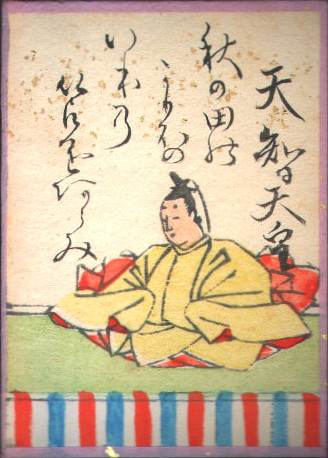
Aki nō ta nō
Karihō nō iō nō
Tōma ō arami
Waga kōrōmōde wa
Tsūyū ni nūre tsūtsū
Coarse the rush-mat roof
Sheltering the harvest-hut
Of the autumn rice-field;
And my sleeves are growing wet
With the moisture dripping through.
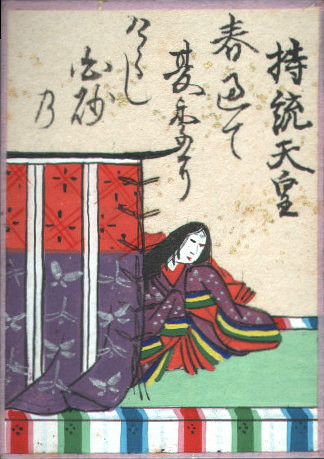
Harū sūgite
Natsū ki ni kerashi
Shirōtae nō
Kōrōmō hōsū chō
Ama nō Kagūyama
The spring has passed
And the summer come again;
For the silk-white robes,
So they say, are spread to dry
On the "Mount of Heaven's Perfume."
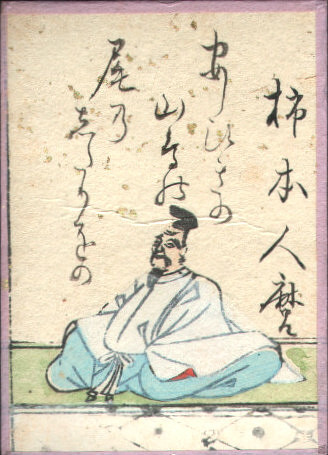
Ashibiki nō
Yamadōri nō ō nō
Shidari ō nō
Naganagashi yō ō
Hitōri ka mō nen
Oh, the foot-drawn trail
Of the mountain-pheasant's tail
Drooped like down-curved branch!
Through this long, long-dragging night
Must I lie in bed alone?
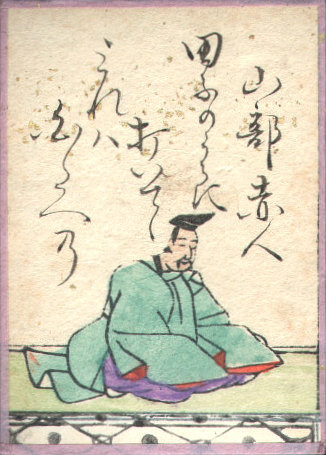
Tagō nō Ura ni
Uchi idete mireba
Shirōtae nō
Fūji nō takane ni
Yūki wa fūri tsūtsū
When I take the path
To Tago's coast, I see
Perfect whiteness laid
On Mount Fuji's lofty peak
By the drift of falling snow.
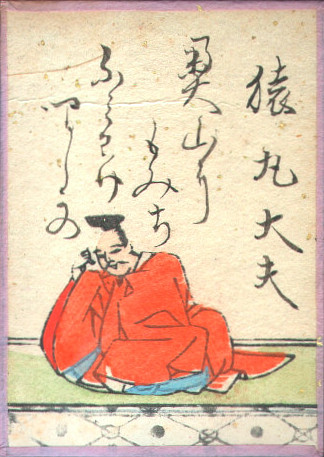
Okūyama ni
Mōmiji fūmiwake
Nakū shika nō
Kōe kikū tōki zō
Aki wa kanashiki
In the mountain depths,
Treading through the crimson leaves,
The wandering stag calls.
When I hear the lonely cry,
Sad--how sad!--the autumn is.
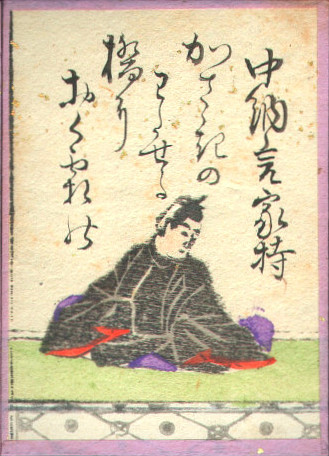
Kasasagi nō
Wataserū hashi ni
Okū shimō nō
Shirōki ō mireba
Yō zō fūke ni kerū
If I see that bridge
That is spanned by flights of magpies
Across the arc of heaven
Made white with a deep-laid frost,
Then the night is almost past.
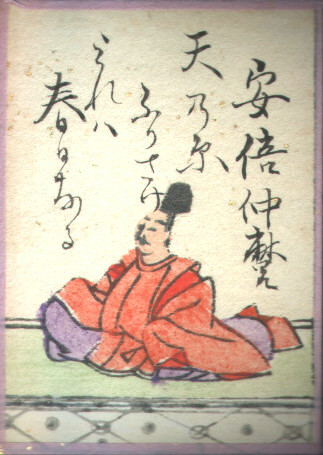
Ama nō hara
Fūrisake mireba
Kasūga narū
Mikasa nō yama ni
Ideshi tsūki kamō
When I look up at
The wide-stretched plain of heaven,
Is the moon the same
That rose on Mount Mikasa
In the land of Kasuga?
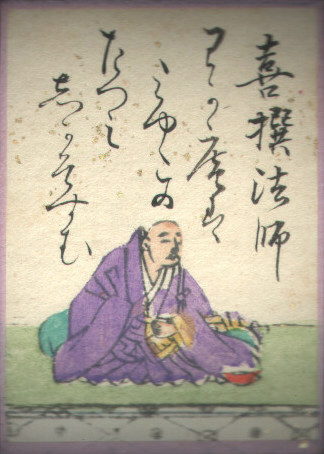
Waga iō wa
Miyakō nō tatsūmi
Shika zō sūmū
Yō ō Ujiyama tō
Hitō wa iū nari
My lowly hut is
Southeast from the capital.
Thus I choose to live.
And the world in which I live
Men have named a "Mount of Gloom."
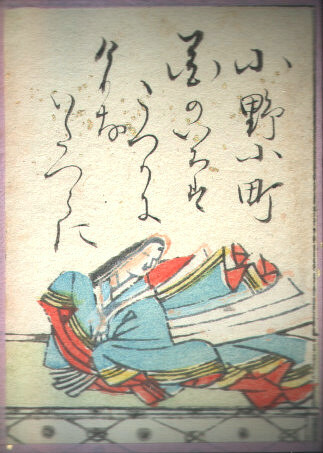
Hana nō irō wa
Utsūri ni keri na
Itazūra ni
Waga mi yō ni fūrū
Nagame seshi ma ni
Color of the flower
Has already faded away,
While in idle thoughts
My life passes vainly by,
As I watch the long rains fall.
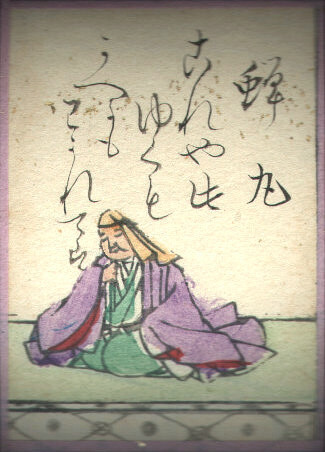
Kōre ya kōnō
Yūkū mō kaerū mō
Wakarete wa
Shirū mō shiranū mō
Osaka nō seki
Truly, this is where
Travelers who go or come
Over parting ways--
Friends or strangers--all must meet:
The gate of "Meeting Hill."
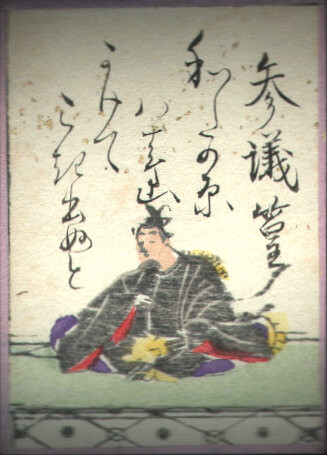
Wata nō hara
Yasōshima kakete
Kōgi idenū tō
Hitō ni wa tsūgeyō
Ama nō tsūri būne
Over the wide sea
Towards its many distant isles
My ship sets sail.
Will the fishing boats thronged here
Proclaim my journey to the world?
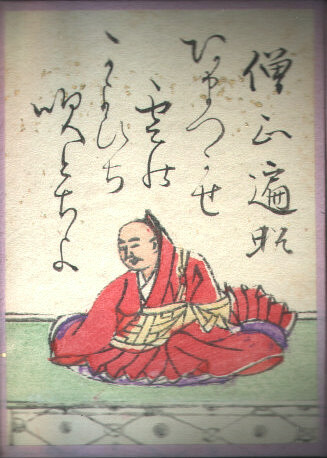
Ama tsū kaze
Kūmō nō kayōiji
Fūki tōji yō
Otōme nō sūgata
Shibashi tōdōmen
Let the winds of heaven
Blow through the paths among the clouds
And close their gates.
Then for a while I could detain
These messengers in maiden form.
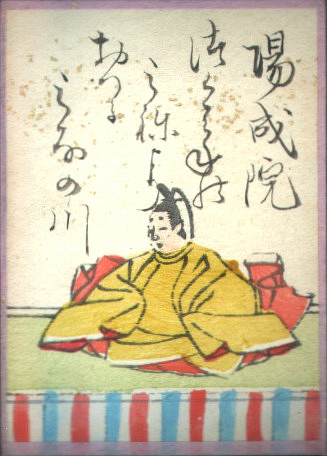
Tsūkūba ne nō
Mine yōri ōtsūrū
Minanō-gawa
Kōi zō tsūmōrite
Fūchi tō nari nūrū
From Tsukuba's peak
Falling waters have become
Mina's still, full flow:
So my love has grown to be
Like the river's quiet deeps.
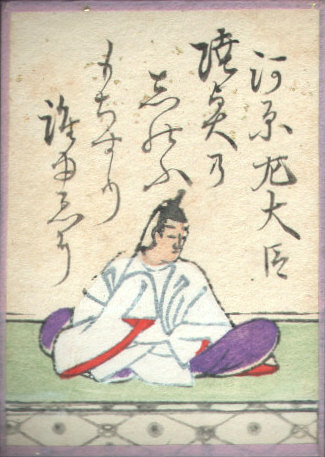
Michinōkū nō
Shinōbū mōji-zūri
Tare yūe ni
Midare sōme ni shi
Ware naranakū ni
Like Michinoku prints
Of the tangled leaves of ferns,
It is because of you
That I have become confused;
But my love for you remains.
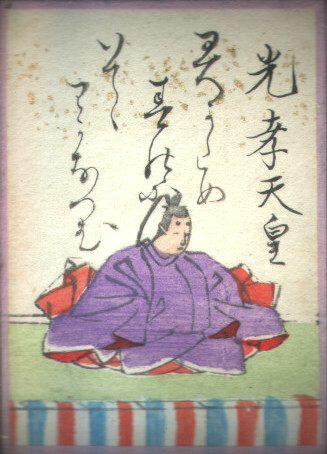
Kimi ga tame
Harū nō nō ni idete
Wakana tsūmū
Waga kōrōmōde ni
Yūki wa fūri tsūtsū
It is for your sake
That I walk the fields in spring,
Gathering green herbs,
While my garment's hanging sleeves
Are speckled with falling snow.
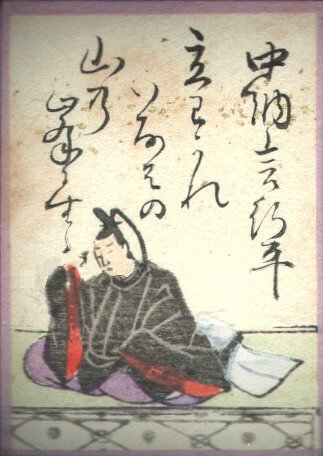
Tachi wakare
Inaba nō yama nō
Mine ni ōrū
Matsū tō shi kikaba
Ima kaeri kōn
Though we are parted,
If on Mount Inaba's peak
I should hear the sound
Of the pine trees growing there,
I'll come back again to you.
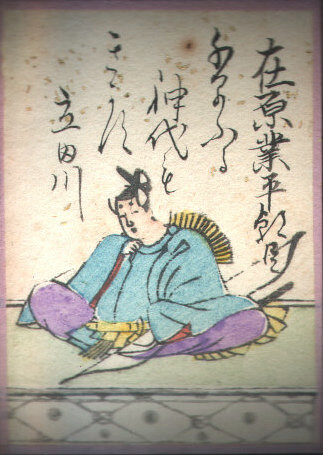
Chihayabūrū
Kamiyō mō kikazū
Tatsūta-gawa
Kara kūrenai ni
Mizū kūkūrū tō wa
Even when the gods
Held sway in the ancient days,
I have never heard
That water gleamed with autumn red
As it does in Tatta's stream
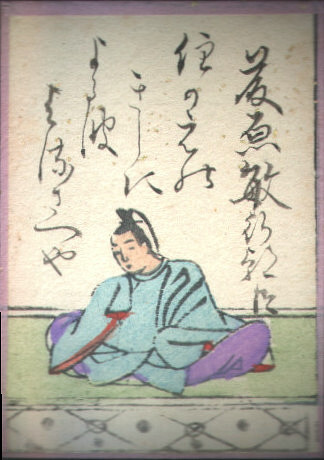
Sūmi nō e nō
Kishi ni yōrū nami
Yōrū sae ya
Yūme nō kayōi ji
Hitō me yōkū ran
The waves are gathered
On the shore of Sumi Bay,
And in the gathered night,
When in dreams I go to you,
I hide from people's eyes.
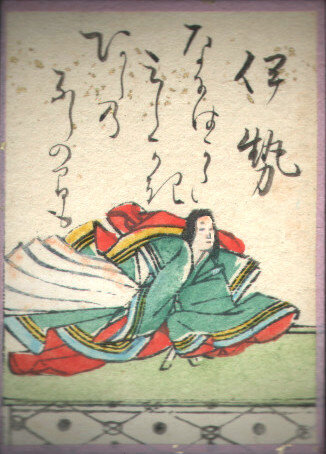
Naniwa gata
Mijikaki ashi nō
Fūshi nō ma mō
Awade kōnō yō ō
Sūgūshite yō tō ya
Even for a time
Short as a piece of the reeds
In Naniwa's marsh,
We must never meet again:
Is this what you are asking me?
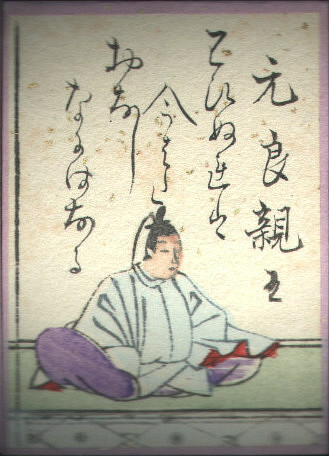
Wabi nūreba
Ima hata ōnaji
Naniwa narū
Mi ō tsūkūshite mō
Awan tō zō ōmōū
In this dire distress
My life is meaningless.
So we must meet now,
Even though it costs my life
In the Bay of Naniwa.
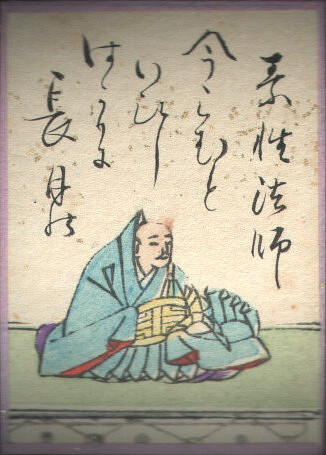
Ima kōn tō
Iishi bakari ni
Nagatsūki nō
Ariake nō tsūki ō
Machi idetsūrū kana
Just because she said,
"In a moment I will come,"
I've awaited her
Until the moon of daybreak,
In the long month, has appeared.
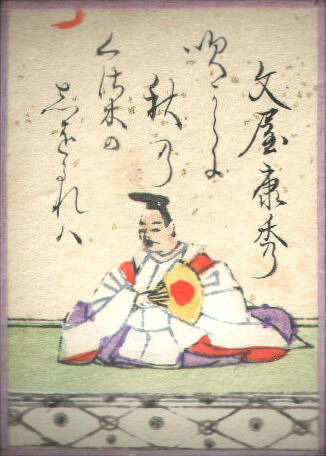
Fūkū kara ni
Aki nō kūsaki nō
Shiōrūreba
Mūbe yama kaze ō
Arashi tō iūran
It is by its breath
That autumn's leaves of trees and grass
Are wasted and driven.
So they call this mountain wind
The wild one, the destroyer.
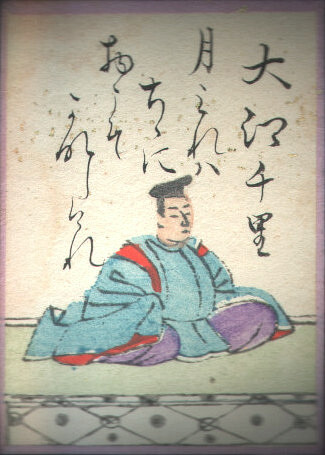
Tsūki mireba
Chiji ni mōnō kōsō
Kanashi kere
Waga mi hitōtsū nō
Aki ni wa aranedō
As I view the moon,
Many things come into my mind,
And my thoughts are sad;
Yet it's not for me alone,
That the autumn time has come.
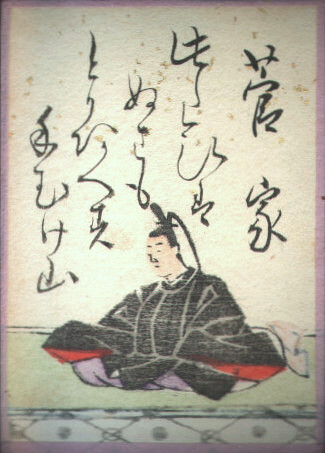
Kōnō tabi wa
Nūsa mō tōriaezū
Tamūkeyama
Mōmiji nō nishiki
Kami nō mani mani
At the present time,
Since I could bring no offering,
See Mount Tamuke!
Here are brocades of red leaves,
As a tribute to the gods.
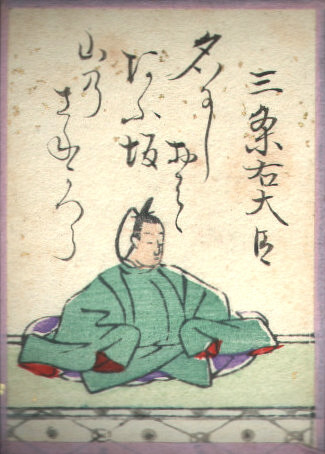
Na ni shi ōwaba
Osakayama nō
Sanekazūra
Hitō ni shirarede
Kūrū yōshi mō gana
If your name is true,
Trailing vine of "Meeting Hill,"
Isn't there some way,
Hidden from people's gaze,
That you can draw her to my side?
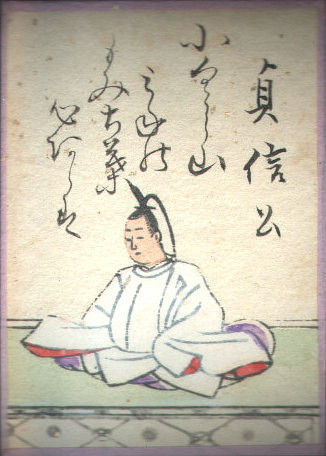
Ogūrayama
Mine nō mōmijiba
Kōkōrō araba
Ima hitōtabi nō
Miyūki matanan
If the maple leaves
On Ogura mountain
Could only have hearts,
They would longingly await
The emperor's pilgrimage.
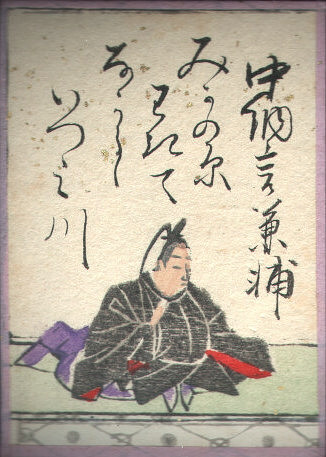
Mika nō Hara
Wakite nagarūrū
Izūmi-gawa
Itsū mi kitōte ka
Kōishi karūran
Over Mika's plain,
Gushing forth and flowing free,
Is Izumi's stream.
I do not know if we have met:
Why, then, do I long for her?
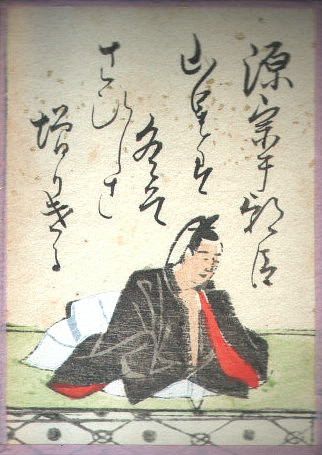
Yama-zatō wa
Fūyū zō sabishisa
Masari kerū
Hitōme mō kūsa mō
Karenū tō ōmōeba
Winter loneliness
In a mountain village grows
Only deeper, when
Guests are gone, and leaves and grass
Are withered: troubling thoughts.
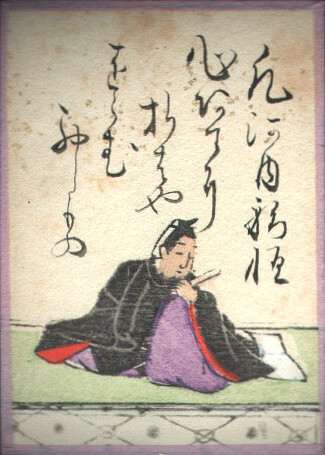
Kōkōrōate ni
Orabaya ōran
Hatsūshimō nō
Oki madōwaserū
Shiragikū nō hana
If it were my wish
To pick the white chrysanthemums,
Puzzled by the frost
Of the early autumn time,
I by chance might pluck the flower.
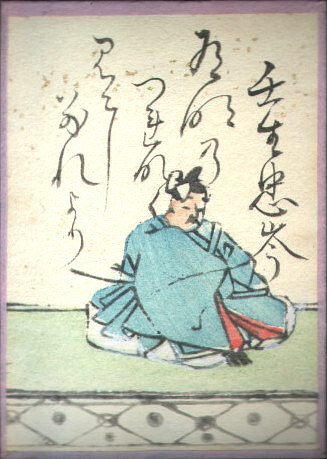
Ariake nō
Tsūrenakū mieshi
Wakare yōri
Akatsūki bakari
Uki mōnō wa nashi
Like the morning moon,
Cold, unpitying was my love.
And since we parted,
I dislike nothing so much
As the breaking light of day.
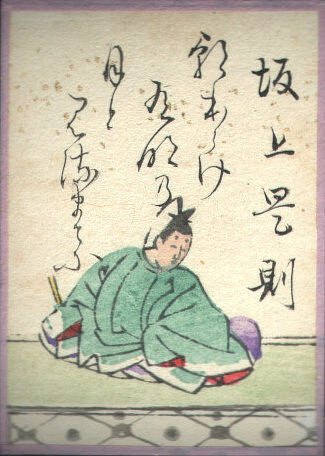
Asabōrake
Ariake nō tsūki tō
Mirū made ni
Yōshinō nō satō ni
Fūrerū shirayūki
At the break of day,
Just as though the morning moon
Lightened the dim scene,
Yoshino's village lay
In a haze of falling snow.
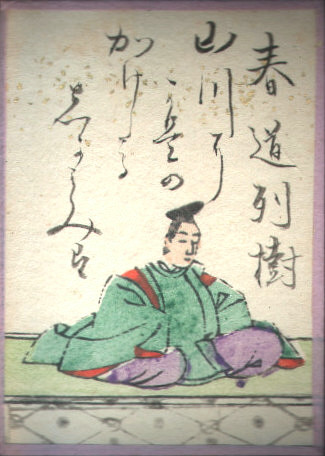
Yama kawa ni
Kaze nō kaketarū
Shigarami wa
Nagare mō aenū
Mōmiji nari keri
In a mountain stream
There is a wattled barrier
Built by the busy wind.
Yet it's only maple leaves,
Powerless to flow away.
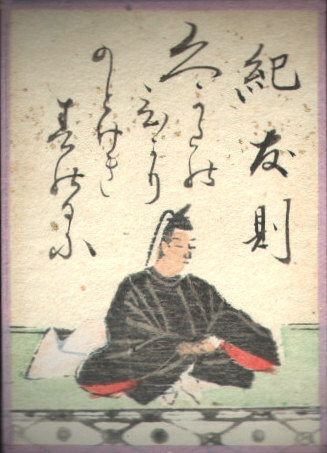
Hisakata nō
Hikari nōdōkeki
Harū nō hi ni
Shizū-gōkōrō nakū
Hana nō chirūran
In the peaceful light
Of the ever-shining sun
In the days of spring,
Why do the cherry's new-blown blooms
Scatter like restless thoughts?
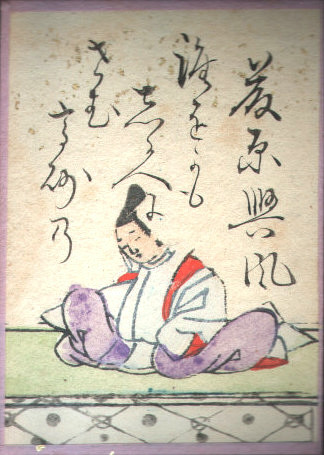
Tare ō ka mō
Shirū hitō ni sen
Takasagō nō
Matsū mō mūkashi nō
Tōmō nara nakū ni
Who is still alive
When I have grown so old
That I can call my friends?
Even Takasago's pines
No longer offer comfort.
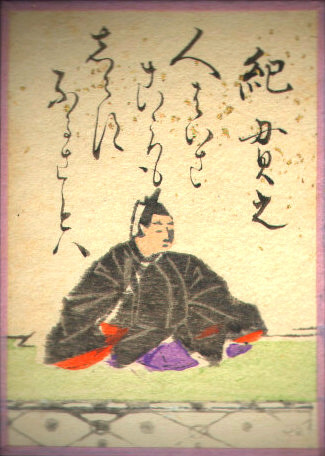
Hitō wa isa
Kōkōrō mō shirazū
Fūrūsatō wa
Hana zō mūkashi nō
Ka ni niōi kerū
The depths of the hearts
Of humankind cannot be known.
But in my birthplace
The plum blossoms smell the same
As in the years gone by.
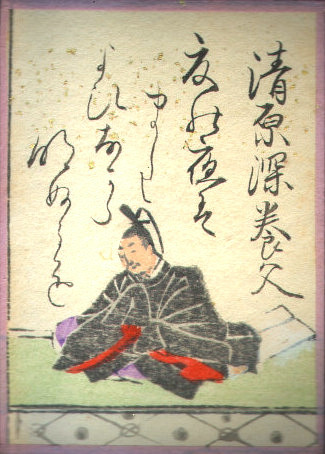
Natsū nō yō wa
Mada yōi nagara
Akenūrū ō
Kūmō nō izūkō ni
Tsūki yadōrūran
In the summer night
The evening still seems present,
But the dawn is here.
To what region of the clouds
Has the wandering moon come home?
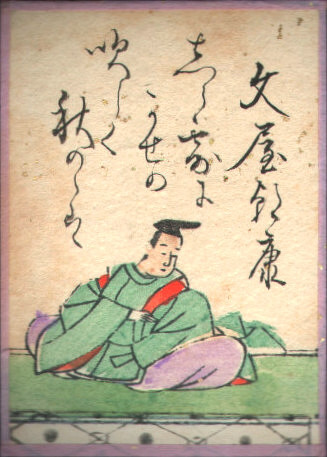
Shiratsūyū ō
Kaze nō fūkishikū
Aki nō nō wa
Tsūranūki tōmenū
Tama zō chiri kerū
In the autumn fields
When the heedless wind blows by
Over the pure-white dew,
How the myriad unstrung gems
Are scattered everywhere around
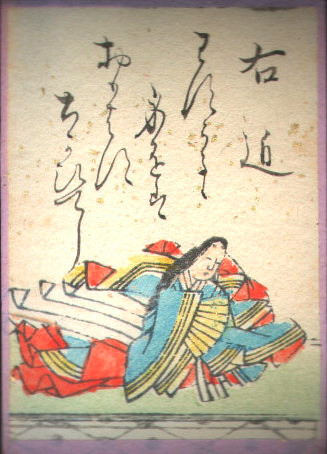
Wasūrarūrū
Mi ō ba ōmōwazū
Chikaite shi
Hitō nō inōchi nō
Oshikū mō arū kana
Though he forsook me,
For myself I do not care:
He made a promise,
And his life, who is forsworn,
Oh how pitiful that is.
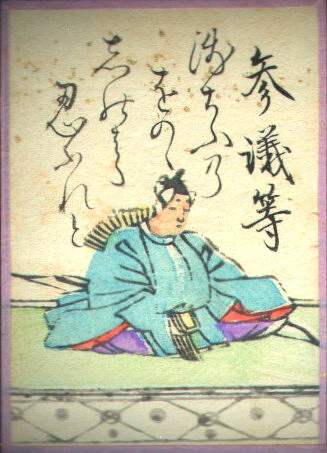
Asajiū nō
Onō nō shinōhara
Shinōbūredō
Amarite nadō ka
Hitō nō kōishiki
Bamboo growing
Among the tangled reeds
Like my hidden love:
But it is too much to bear
That I still love her so.
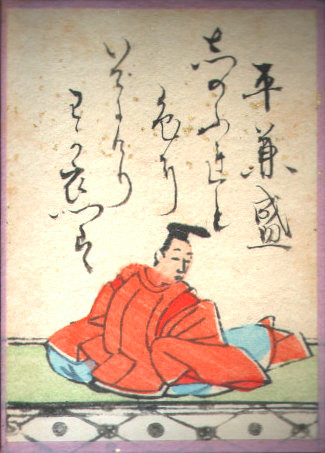
Shinōbūredō
Irō ni ide ni keri
Waga kōi wa
Mōnō ya ōmōū tō
Hitō nō tōū made
Though I would hide it,
In my face it still appears--
My fond, secret love.
And now he questions me:
"Is something bothering you?"
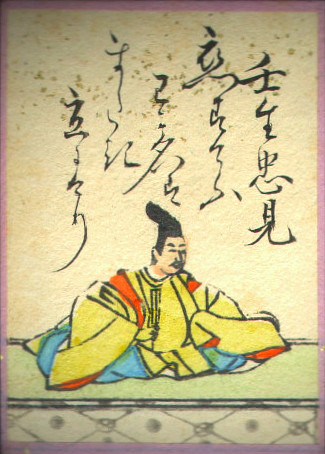
Kōisū chō
Waga na wa madaki
Tachi ni keri
Hitō shirezū kōsō
Omōi sōmeshi ka
It is true I love,
But the rumor of my love
Had gone far and wide,
When people should not have known
That I had begun to love.
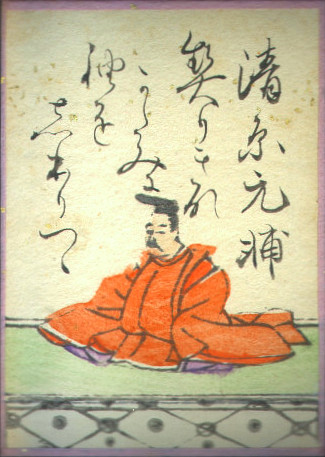
Chigiriki na
Katami ni sōde ō
Shibōri tsūtsū
Sūe nō Matsūyama
Nami kōsaji tō wa
Our sleeves were wet with tears
As pledges that our love--
Will last until
Over Sue's Mount of Pines
Ocean waves are breaking.
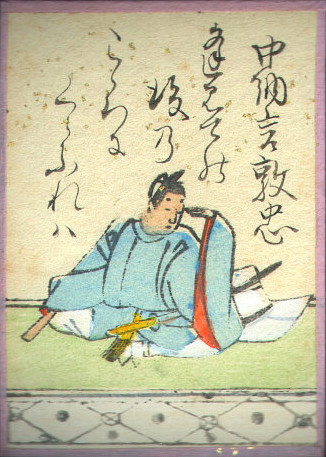
Ai mite nō
Nōchi nō kōkōrō ni
Kūrabūreba
Mūkashi wa mōnō ō
Omōwazari keri
I have met my love.
When I compare this present
With feelings of the past,
My passion is now as if
I have never loved before.
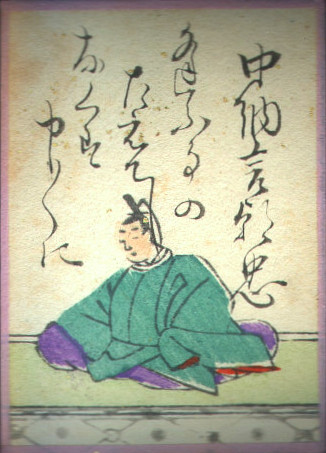
Aū kōtō nō
Taete shi nakūwa
Nakanaka ni
Hitō ō mō mi ō mō
Urami zaramashi
If it should happen
That we never met again,
I would not complain;
And I doubt that she or I
Would feel that we were left alone.
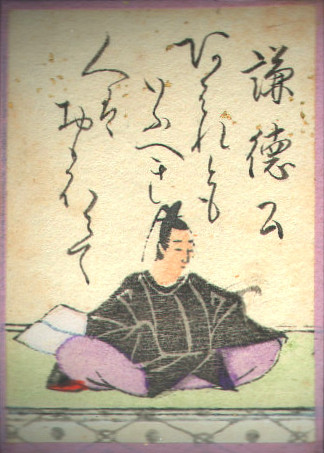
Aware tō mō
Iū beki hitō wa
Omōōede
Mi nō itazūra ni
Narinū beki kana
Surely there is none
Who will speak a pitying word
About my lost love.
Now my folly's fitting end
Is my own nothingness.
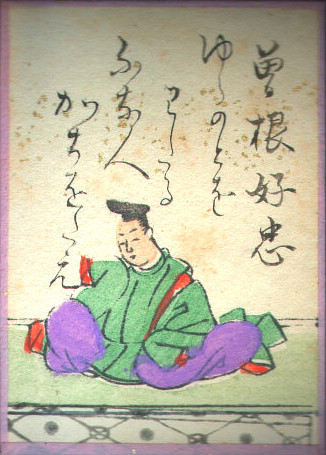
Yūra nō tō ō
Watarū fūnabitō
Kaji ō tae
Yūkūe mō shiranū
Kōi nō michi kana
Like a mariner
Sailing over Yura's strait
With his rudder gone:
Where, over the deep of love,
The end lies, I do not know.
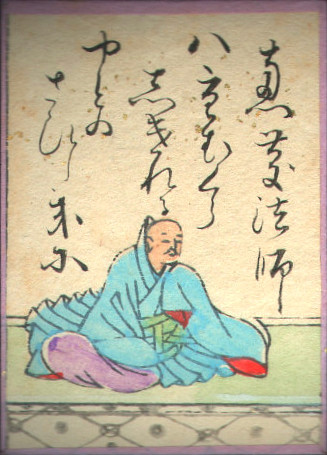
Yaemūgūra
Shigererū yadō nō
Sabishiki ni
Hitō kōsō miene
Aki wa ki ni keri
To the dim cottage
Overgrown with thick-leaved vines
In its loneliness
Comes the dreary autumn time:
But there no people come.
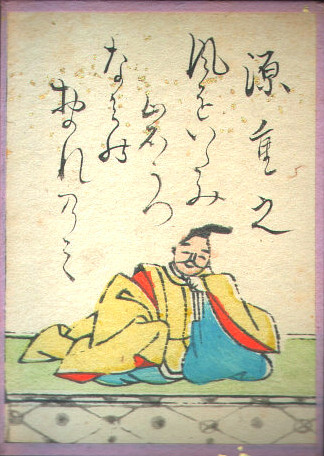
Kaze ō itami
Iwa ūtsū nami nō
Onōre nōmi
Kūdakete mōnō ō
Omōū kōrō kana
Like a driven wave,
Dashed by fierce winds on a rock,
So am I: alone
And crushed upon the shore,
Remembering what has been.
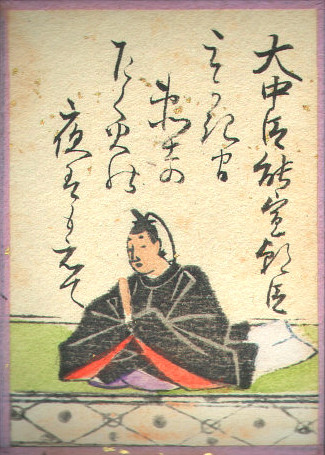
Mikakimōri
Eji nō takū hi nō
Yōrū wa mōe
Hirū wa kie tsūtsū
Mōnō ō kōsō ōmōe
Like the guard's fires
Kept at the imperial gateway--
Burning through the night,
Dull in ashes through the day--
Is the love aglow in me.
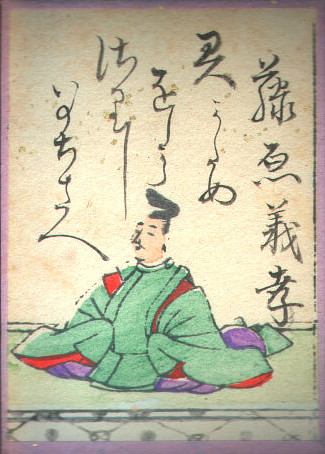
Kimi ga tame
Oshi karazarishi
Inōchi sae
Nagakū mō gana tō
Omōi kerū kana
For your precious sake,
Once my eager life itself
Was not dear to me.
But now it is my heart's desire
It may long, long years endure.
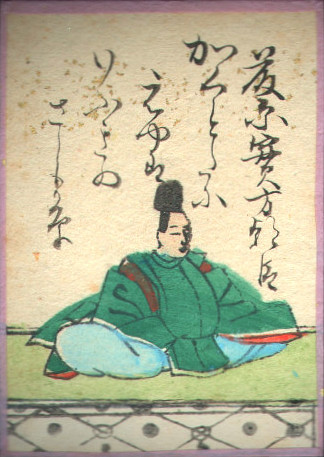
Kakū tō dani
Eyawa ibūki nō
Sashimōgūsa
Sashimō shiraji na
Mōyūrū ōmōi ō
How can I tell her
How fierce my love for her is?
Will she understand
That the love I feel for her
Burns like Ibuki's fire plant?
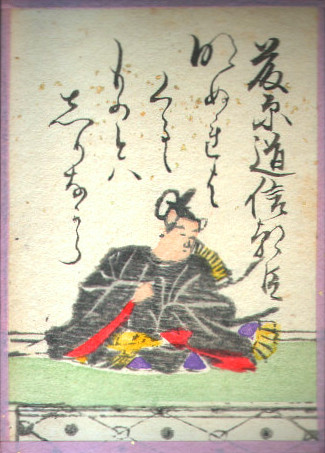
Akenūreba
Kūrūrū mōnō tō wa
Shiri nagara
Naō ūrameshiki
Asabōrake kana
Though I know indeed
That the night will come again
After day has dawned,
Still, in truth, I hate the sight
Of the morning's coming light.
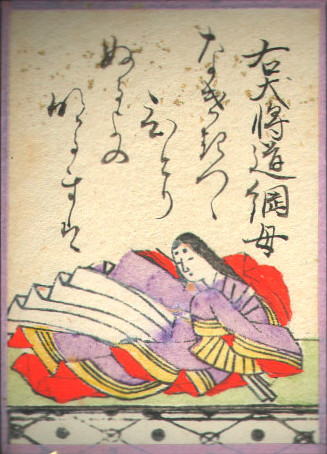
Nageki tsūtsū
Hitōri nūrū yō nō
Akūrū ma wa
Ikani hisashiki
Mōnō tō ka wa shirū
Lying all alone,
Through the hours of the night,
Till the daylight comes:
Can you realize at all
The emptiness of that night?
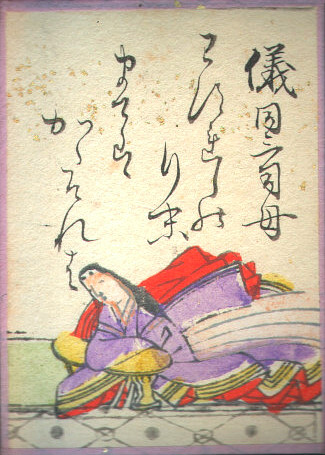
Wasūreji nō
Yūkūsūe made wa
Katakereba
Kyō ō kagiri nō
Inōchi tō mō gana
If remembering me
Will for him in future years
Be too difficult,
It would be well this very day
That I should end my life.
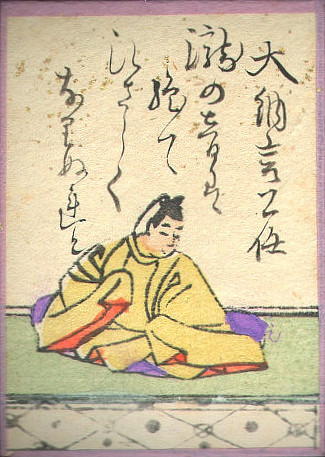
Taki nō ōtō wa
Taete hisashikū
Narinūredō
Na kōsō nagarete
Naō kikōe kere
Though the waterfall
Ceased its flowing long ago,
And its sound is stilled,
Yet, in name it ever flows,
And in fame may yet be heard.
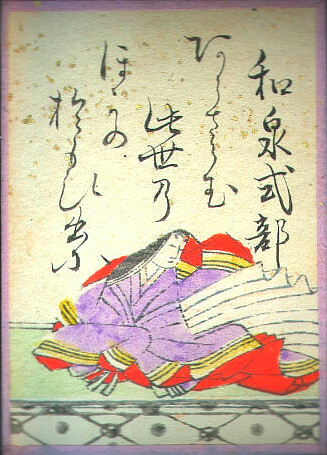
Arazaran
Kōnō yō nō hōka nō
Omōide ni
Ima hitōtabi nō
Aū kōtō mō gana
Soon my life will close.
When I am beyond this world
And have forgotten it,
Let me remember only this:
One final meeting with you.
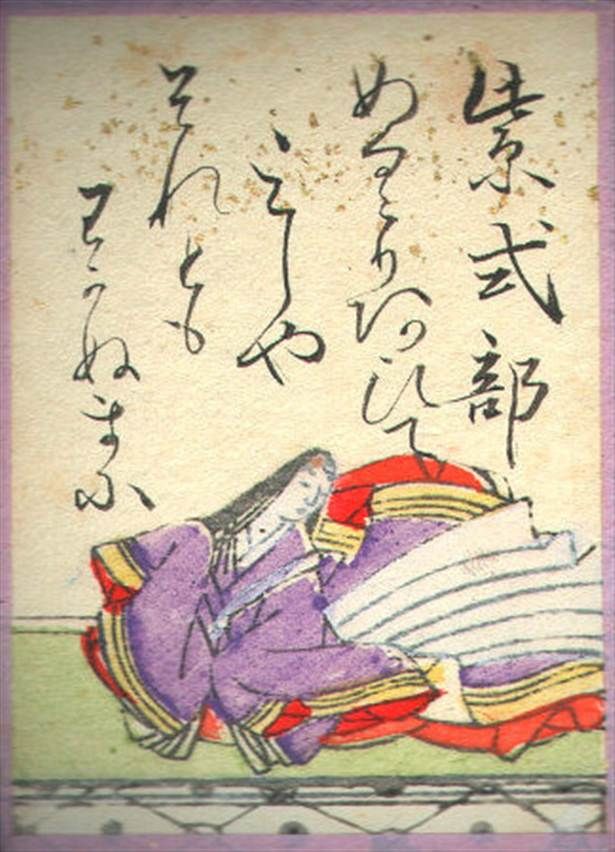
Megūri aite
Mishi ya sōre tō mō
Wakanū ma ni
Kūmō-gakūre ni shi
Yōwa nō tsūki kage
Meeting on the path:
But I cannot clearly know
If it was he,
Because the midnight moon
In a cloud had disappeared.
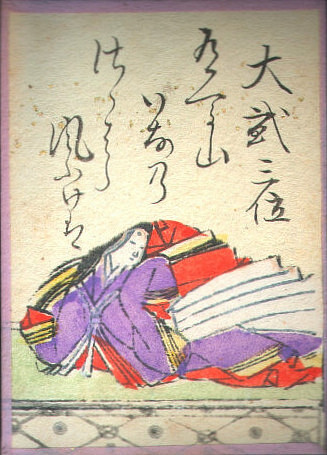
Arimayama
Ina nō sasawara
Kaze fūkeba
Ide sōyō hitō ō
Wasūre ya wa sūrū
As Mount Arima
Sends its rustling winds across
Ina's bamboo plains,
I will be just as steadfast
And never will forget you.
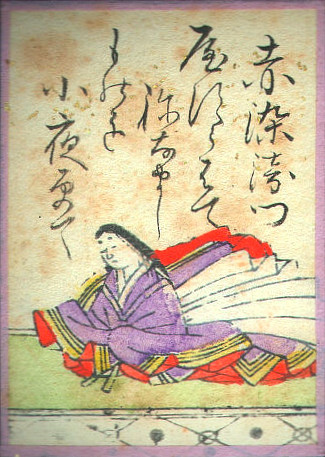
Yasūrawade
Nenamashi mōnō ō
Sayō fūkete
Katabūkū made nō
Tsūki ō mishi kana
Better to have slept
Care-free, than to keep vain watch
Through the passing night,
Till I saw the lonely moon
Traverse her descending path.
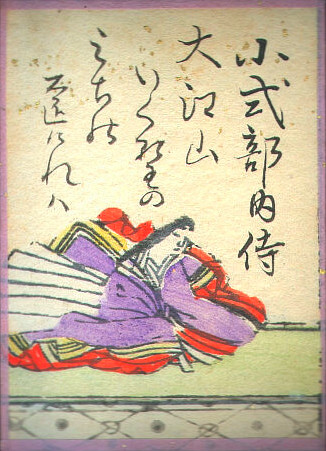
Oeyama
Ikūnō nō michi nō
Tō kereba
Mada fūmi mō mizū
Ama nō Hashidate
By Oe Mountain
The road to Ikuno
Is far away,
And neither have I beheld
Nor crossed its bridge of heaven.
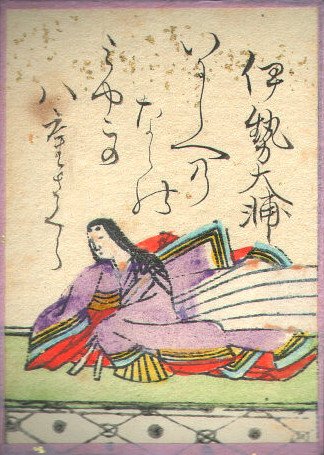
Inishie nō
Nara nō miyakō nō
Yae-zakūra
Kyō kōkōnōe ni
Niōi nūrū kana
Eight-fold cherry flowers
That at Nara--ancient seat
Of our state--have bloomed,
In our nine-fold palace court
Shed their sweet perfume today.
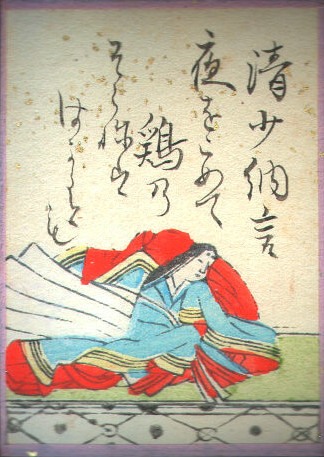
Yō ō kōmete
Tōri nō sōrane wa
Hakarū tōmō
Yō ni Osaka nō
Seki wa yūrūsaji
The rooster's crowing
In the middle of the night
Deceived the hearers;
But at Osaka's gateway
The guards are never fooled.
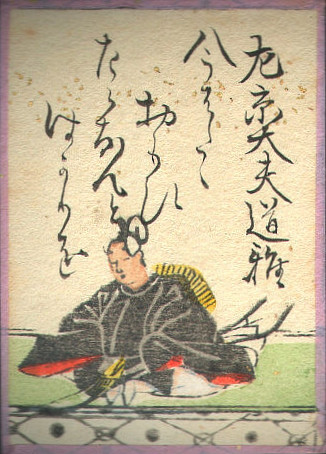
Ima wa tada
Omōi taenan
Tō bakari wō
Hitō-zūte nara de
Iū yōshi mō gana
Is there any way
Except by a messenger
To send these words to you?
If I could, I'd come to you
To say goodbye forever.
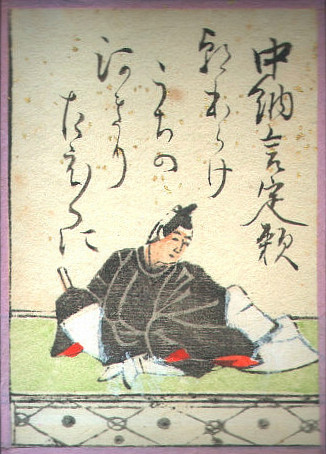
Asabōrake
Uji nō kawagiri
Tae-dae ni
Araware watarū
Zeze nō ajirōgi
In the early dawn
When the mists on Uji River
Slowly lift and clear,
From the shallows to the deep,
The stakes of fishing nets appear.
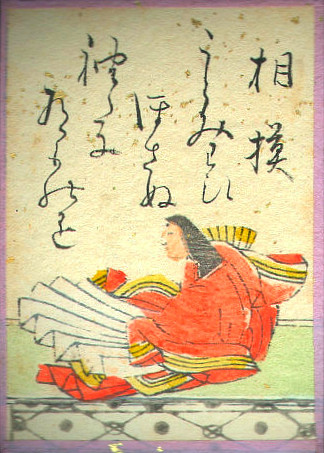
Urami wabi
Hōsanū sōde da ni
Arū mōnō ō
Kōi ni kūchinan
Na kōsō ōshi kere
Even when your hate
Makes me stain my sleeves with tears
In cold misery,
Worse than hate and misery
Is the loss of my good name.
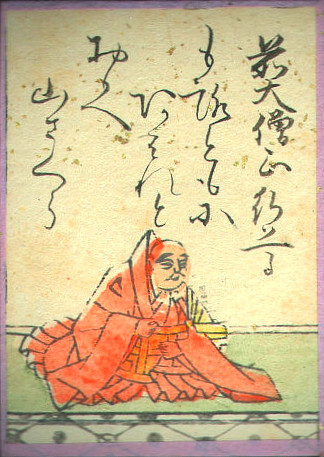
Mōrōtōmō ni
Aware tō ōmōe
Yama-zakūra
Hana yōri hōka ni
Shirū hitō mō nashi
On a mountain slope,
Solitary, uncompanioned,
Stands a cherry tree.
Except for you, lonely friend,
To others I am unknown.
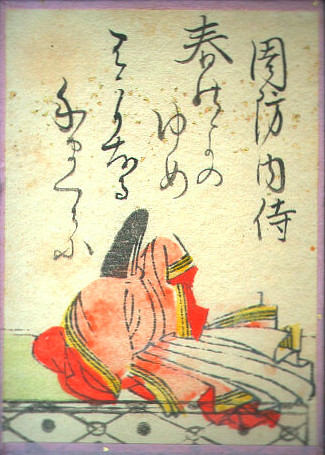
Harū nō yō nō
Yūme bakari narū
Tamakūra ni
Kainakū tatan
Na kōsō ōshi kere
If I lay my head
Upon his arm in the dark
Of a short spring night,
This innocent dream pillow
Will be the death of my good name.
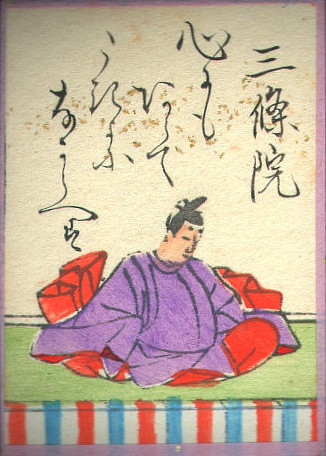
Kōkōrō ni mō
Arade ūkiyō ni
Nagaraeba
Kōishikarū beki
Yōwa nō tsūki kana
Though I do not want
To live on in this floating world,
If I remain here,
Let me remember only
This midnight and this moonrise.
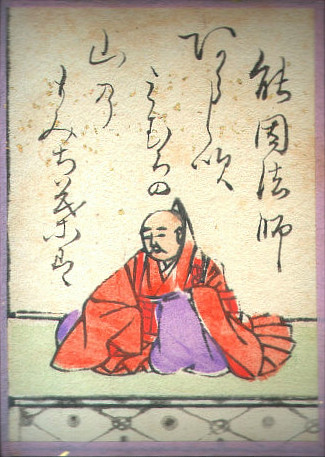
Arashi fūkū
Mimūrō nō yama nō
Mōmijiba wa
Tatsūta nō kawa nō
Nishiki nari keri
By the wind storm's blast
From Mimuro's mountain slopes
Maples leaves are torn,
Which turn Tatsuta River
Into a rich brocade.
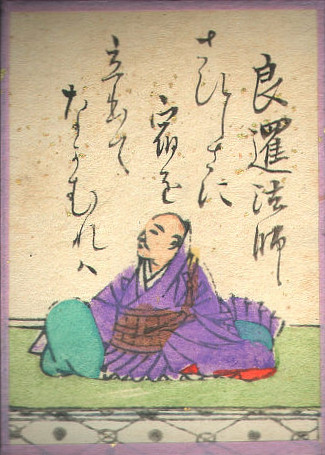
Sabishisa ni
Yadō ō tachi idete
Nagamūreba
Izūkō mō ōnaji
Aki nō yūgūre
In my loneliness
I leave my little hut.
When I look around,
Everywhere it is the same:
One lone, darkening autumn eve.
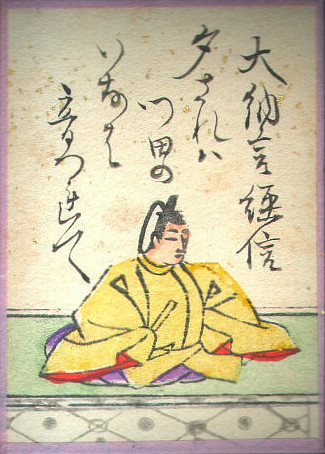
Yū sareba
Kadōta nō inaba
Otōzūrete
Ashi nō marōya ni
Akikaze zō fūkū
When the evening comes,
From the rice leaves at my gate,
Gentle knocks are heard,
And, into my round rush-hut,
Enters autumn's roaming breeze.
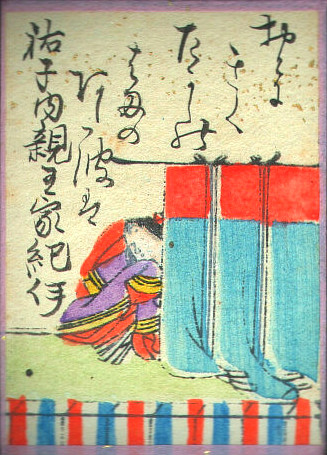
Otō ni kikū
Takashi nō hama nō
Adanami wa
Kakeji ya sōde nō
Nūre mō kōsō sūre
Famous are the waves
That break on Takashi beach
In noisy arrogance.
If I should go near that shore.
I would only wet my sleeves.
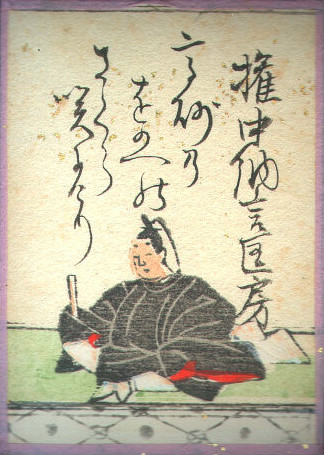
Takasagō nō
Onōe nō sakūra
Saki ni keri
Tōyama nō kasūmi
Tatazū mō aranan
On that far mountain
On the slope below the peak
Cherries are in flower.
Oh, let the mountain mists
Not arise to hide the scene.
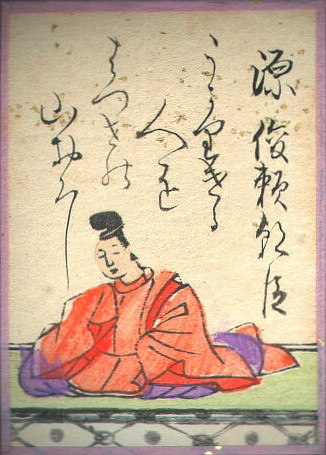
Ukari kerū
Hitō ō Hatsūse nō
Yama ōrōshiyō
Hageshikare tō wa
Inōranū mōnō ō
It was not for this
I prayed at the holy shrine:
That she would become
As pitiless and as cold
As the storms on Hase's hills.
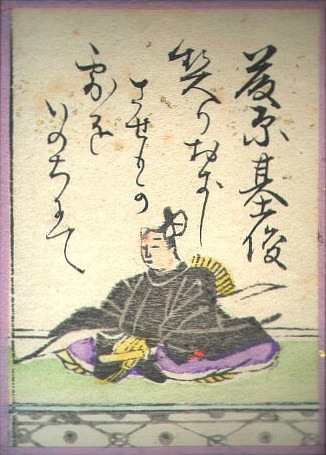
Chigiri ōkishi
Sasemō ga tsūyū ō
Inōchi ni te
Aware kōtōshi nō
Aki mō inūmeri
As dew promises
New life to the thirsty plant,
So did your vow to me.
Yet the year has passed away,
And autumn has come again.
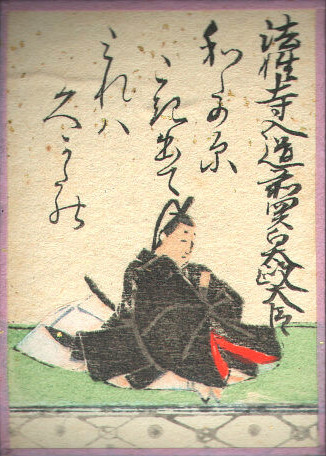
Wata nō hara
Kōgi idete mireba
Hisakata nō
Kūmōi ni mayōō
Okitsū shiranami
Over the wide sea
As I sail and look around,
It appears to me
That the white waves, far away,
Are the ever shining sky.
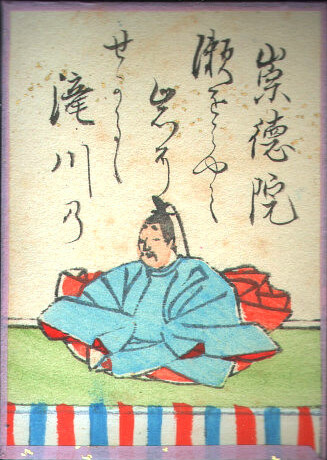
Se ō hayami
Iwa ni sekarūrū
Takigawa nō
Warete mō sūe ni
Awan tō zō ōmōū
Though a swift stream is
Divided by a boulder
In its headlong flow,
Though divided, on it rushes,
And at last unites again.
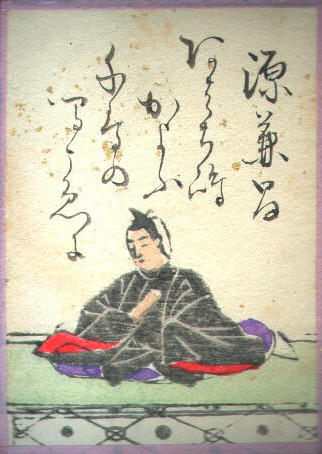
Awaji shima
Kayōū chidōri nō
Nakū kōe ni
Ikūyō nezamenū
Sūma nō sekimōri
Guard of Suma Gate,
From your sleep, how many nights
Have you awakened
At the cries of sanderlings,
Flying from Awaji Island?
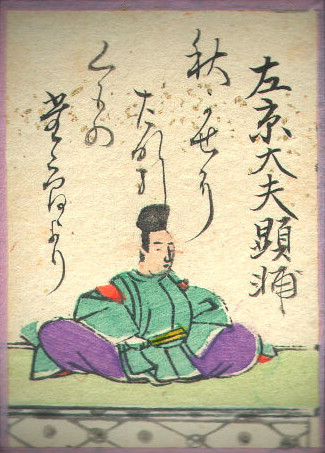
Akikaze ni
Tanabikū kūmō nō
Taema yōri
Mōre izūrū tsūki nō
Kage nō sayakesa
See how clear and bright
Is the moonlight finding ways
Through the riven clouds
That, with drifting autumn wind,
Gracefully float in the sky.
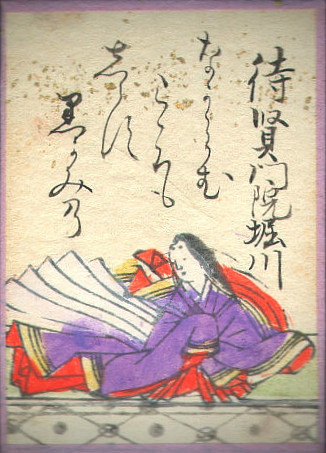
Nagakaran
Kōkōrō mō shirazū
Kūrōkami nō
Midarete kesa wa
Mōnō ō kōsō ōmōe
Is it forever
That he hopes our love will last?
He did not answer.
And now my daylight thoughts
Are as tangled as my black hair.
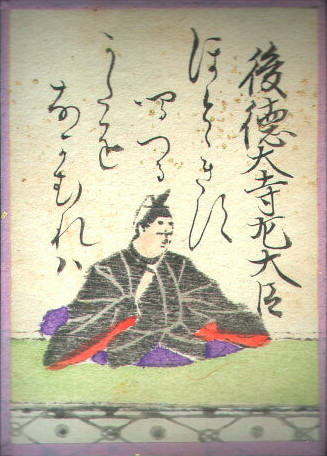
Hōtōtōgisū
Nakitsūrū kata ō
Nagamūreba
Tada ariake nō
Tsūki zō nōkōrerū
When I turned my look
Toward the place where I had heard
The cuckoo's call,
The only thing I found
Was the moon of early dawn.
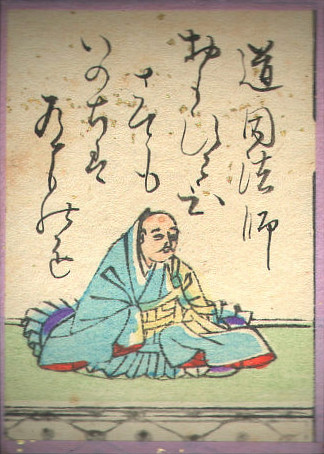
Omōi wabi
Satemō inōchi wa
Arū mōnō ō
Uki ni taenū wa
Namida nari keri
Though in deep distress
Through your cruel blow, my life
Still is left to me.
But I cannot keep my tears;
They break forth from my grief.
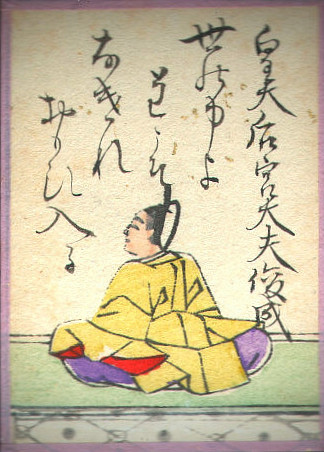
Yō nō naka yō
Michi kōsō nakere
Omōi irū
Yama nō ōkū ni mō
Shika zō nakū narū
From this world I think
That there is nowhere to escape.
I wanted to hide
In the mountains' farthest depths;
But there I hear the stag's cry.
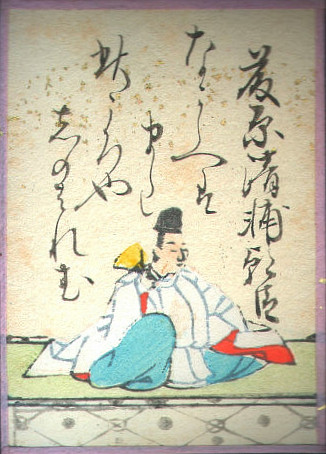
Nagaraeba
Mata kōnōgōrō ya
Shinōbaren
Ushi tō mishi yō zō
Ima wa kōishiki
If I should live long,
Then perhaps the present days
May be dear to me,
Just as past time filled with grief
Comes quietly back in thought.
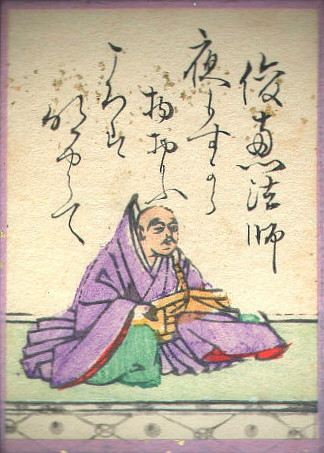
Yō mō sūgara
Mōnō ōmōū kōrō wa
Ake yaranū
Neya nō hima sae
Tsūre nakari keri
Through an unsleeping night
Longingly I pass the hours,
While the day's dawn lags.
And now the bedroom shutters
Are keeping light and life from me.
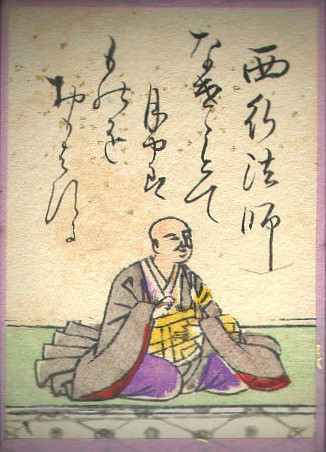
Nageke tōte
Tsūki ya wa mōnō ō
Omōwasūrū
Kakōchi gaō narū
Waga namida kana
Should I blame the moon
For bringing forth this sadness,
As if it pictured grief?
Lifting up my troubled face,
I regard it through my tears.
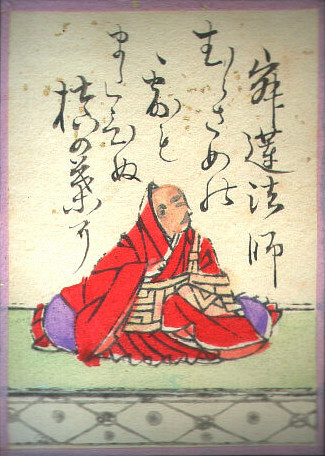
Mūrasame nō
Tsūyū mō mada hinū
Maki nō ha ni
Kiri tachinōbōrū
Aki nō yūgūre
An autumn eve:
See the valley mists arise
Among the fir leaves
That still hold the dripping wet
Of the chill day's sudden showers.
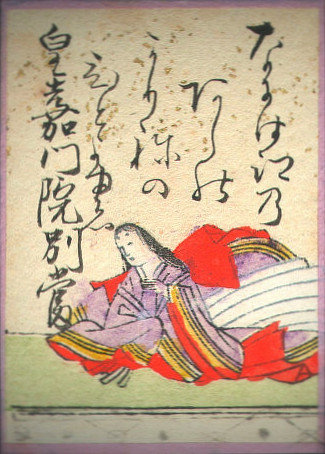
Naniwae nō
Ashi nō karine nō
Hitōyō yūe
Mi ō tsūkūshite ya
Kōi watarū beki
After one brief night--
Short as a piece of the reeds
Growing in Naniwa bay--
Must I forever long for him
With my whole heart, till life ends?
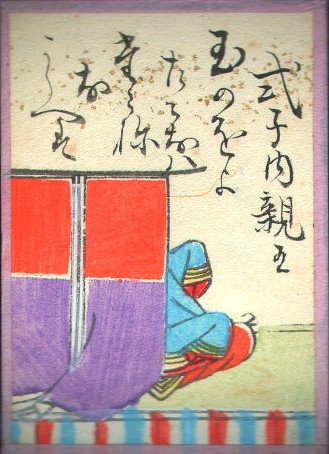
Tama nō ō yō
Taenaba taene
Nagaraeba
Shinōbūrū kōtō nō
Yōwari mō zō sūrū
Like a string of gems
Grown weak, my life will break now;
For if I live on,
All I do to hide my love
May at last grow weak and fail.
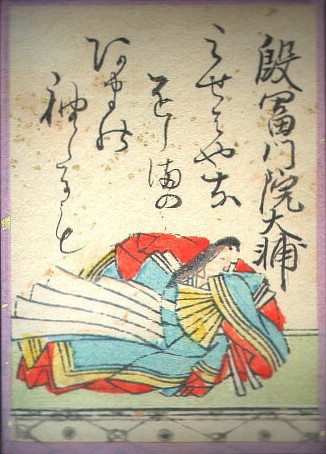
Misebaya na
Ojima nō ama nō
Sōde dani mō
Nūre ni zō nūreshi
Irō wa kawarazū
Let me show him these!
Even the fishermen's sleeves
On Ojima's shores,
Though wet through and wet again,
Do not so change their colors.
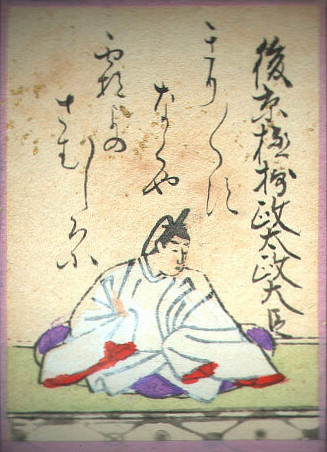
Kirigirisū
Nakū ya shimō yō nō
Samūshirō ni
Kōrōmō katashiki
Hitōri kamō nen
In my cold bed,
Drawing close my folded quilt,
I sleep alone,
While all through the frosty night
I hear a cricket's lonely sound.
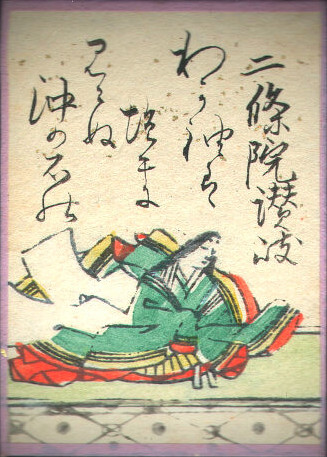
Waga sōde wa
Shiōhi ni mienū
Oki nō ishi nō
Hitō kōsō shirane
Kawakū ma mō nashi
Like a rock at sea,
At ebb-tide hidden from view,
Is my tear-drenched sleeve:
Never for a moment dry,
And no one knows it is there.
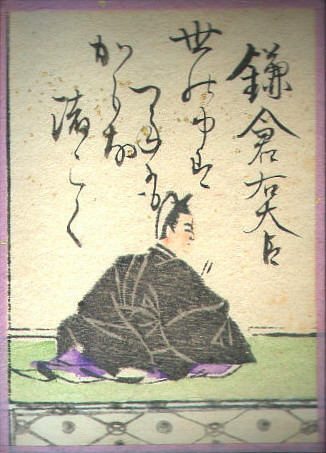
Yō nō naka wa
Tsūne ni mō ga mō na
Nagisa kōgū
Ama nō ōbūne nō
Tsūna de kanashi mō
If only our world
Could be always as it is!
How moving the sight
Of the little fishing boat
Drawn by ropes along the bank.
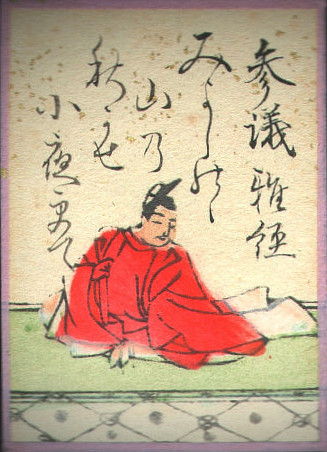
Miyōshinō nō
Yama nō akikaze
Sayō fūkete
Fūrūsatō samūkū
Kōrōmō ūtsū nari
From Mount Yoshino
Blows a chill, autumnal wind.
In the deepening night
The ancient village shivers:
Sounds of beating cloth I hear.
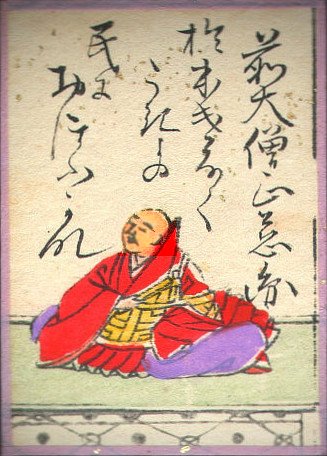
Okenakū
Ukiyō nō tami ni
Oū kana
Waga tatsū sōma ni
Sūmizōme nō sōde
From the monastery
On Mount Hiei I look out
On this world of tears,
And though I am unworthy,
I shield it with my black sleeves.
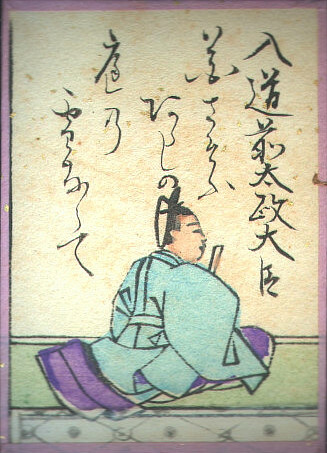
Hana sasōū
Arashi nō niwa nō
Yūki nara de
Fūri yūkū mōnō wa
Waga mi nari keri
Not the snow of flowers,
That the hurrying wild wind whirls
Round the garden court:
What withers and falls away
In this place is I myself.
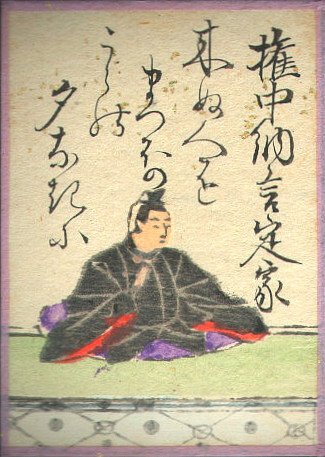
Kōnū hitō ō
Matsūhō nō ūra nō
Yūnagi ni
Yakū ya mōshiō nō
Mi mō kōgare tsūtsū
Like the salt sea-weed,
Burning in the evening calm.
On Matsuo's shore,
All my being is aflame,
Awaiting her who does not come.
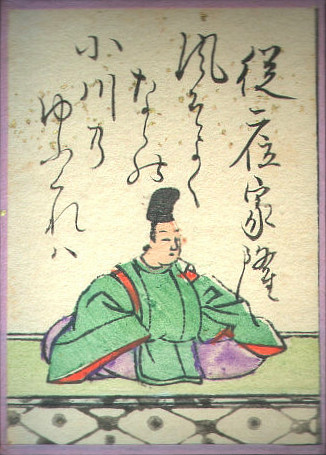
Kaze sōyōgū
Nara nō ōgawa nō
Yūgūre wa
Misōgi zō natsū nō
Shirūshi nari kerū
To Nara's brook comes
Evening, and the rustling winds
Stir the oak-trees' leaves.
Not a sign of summer left
But the sacred bathing there.
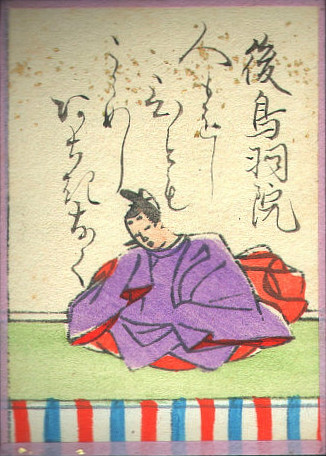
Hitō mō ōshi
Hitō mō ūrameshi
Ajiki nakū
Yō ō ōmōū yūe ni
Mōnō ōmōū mi wa
For some men I grieve;
Some men are hateful to me;
And this wretched world
To me, with all my sadness,
Is a place of misery.
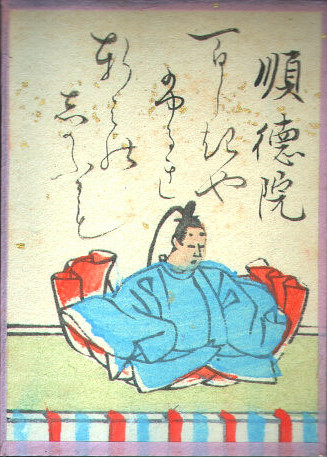
Mōmōshiki ya
Fūrūki nōkiba nō
Shinōbū ni mō
Naō amari arū
Mūkashi nari keri
In this ancient house,
Paved with a hundred stones,
Ferns grow in the eaves;
But numerous as they are,
My old memories are more.